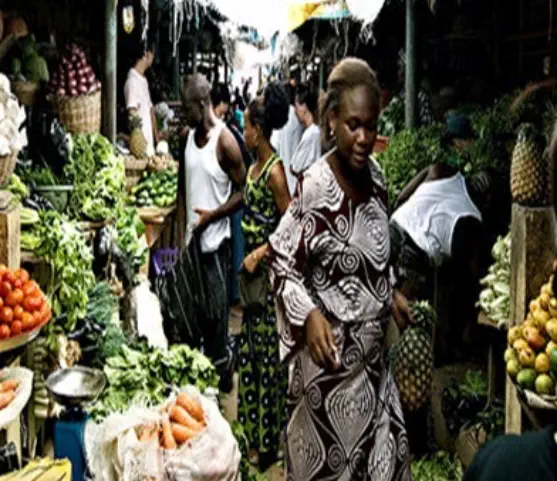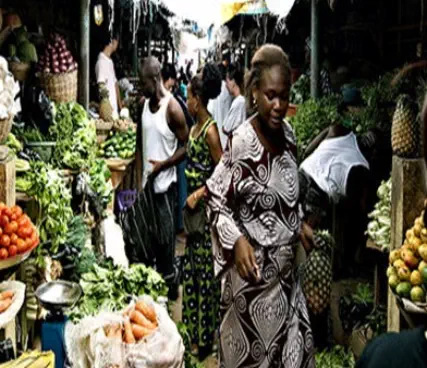IGBOFOCUS
Igbo Market Days
Traditionally, Igbo week consists of four days, which is normally
the four market days, and the four market days are: Eke (eke),
Orie (orie), Afo (afo), Nkwo (nkwo).
Market day is known as ubochi ahia or alternatively can be said
ahia eke, ahia orie, ahia afo, ahia nkwo. Or in many cases,
many people use ubochi ahia eke, ubochi ahia orie, ubochi
ahia afo, ubochi ahia nkwo.
According to Emma Nnadi, Nri Kingdom, Market days in Igbo land
are very significant so much so that the four market days I
mentioned above are uniformly observed within every community
in Igbo land. It was during reign of Eze Nrijiofor 1 (1300-1390AD),
the fifth Eze Nri in the line of succession that Igbo tradition of four
market days was instituted.
Every town in Igbo Land has its own market day. For example,
Umuaka town might have their market day as Eke, while Akpala
town has its own market day as Orie. Amaike town might have
their own market day as Afo, and Uloise town has its market day
as Nkwo.
Therefore before the supermarkets, malls, shops or shopping centres established, if say for example, today is Afo market day, it
means everybody including traders from Umuaka, Akpala and Uloise towns will be heading to Amaike town market to sell or buy all
they require.
Likewise, if today for an example is Eke market, it means everybody from Amaike, Akpala and Uloise towns will be heading to
Umuaka to sell their produce and buy what they need.
To buy and sell would mean that people who produced more yams in their farms may sell or exchange their yams for something
else or sell their yams to have money to buy oil or meat in the market.
Likewise, people who grew a lot of vegetables may want to sell them to buy yam, fish or other items in the market. Traditionally, this
is how people in Igbo Land used to live in those days, although it still goes on now but not as many people used to rely on them as
with back then.
Then rotation of market days - meant that if a person is not too well or not strong enough to travel to different markets every day, the
person will have to wait for three days when it will be the turn of his or her local market to open, so that he or she can buy or sell.
The markets start normally very early in the morning till midday or so.
Therefore, Igbo market days are Eke, Orie, Afo, Nkwo, which still exist today and used by many traders and others wishing to buy
or sell. Sometime people may use market days as a figure of speech - like for example, come to my house after Nkwo market day.
Although some buyers and sellers do use trade by barter in the olden days but majority use money especially nowadays to buy and
sell their goods. These days, major big companies and banks have established themselves around those marketplaces. This is to
be able to offer their services to trades.
In Igbo language, money is called ego. And the bank where money is kept is called ụlọ ego.
The paper money or the bank note is called akwụkwọ ego. And the coins or money coins is called aghirigha ego.
Money to buy items in the market is called ego ahia or even may mean money to be used in the market.
In Igbo language agara mụ ahia means I went to the market
zuta means to buy
ihe means something or item
zuta ihe means buy something
zuputara means buy something for someone
zutara mụ ihe means buy something for me
azutara gị ihe means I bought something for you.
re means sell or re ihe means sell something
achọrọ mụ izu means I want to buy
kwe ọnu means price it or say your price
o di ọnu means the price is high
o di mma means it is okay as it may mean that the price or so is okay
o di ọnu mma means the price is okay
kwuo ugwo or kwuo ego means pay or pay what you owe or pay money
In this section you have learnt the following:
achọrọ mụ izu
Afo
agara mụ ahia
aghirigha ego
ego ahia
ahia
ahia afo
ahia eke
ahia nkwo
ahia orie
akwụkwọ ego
azutara gị ihe
Eke
kwe ọnu
Nkwo
o di mma
o di ọnu
o di ọnu mma
Orie
re
re ihe
ubochi ahia
ubochi ahia afo
ubochi ahia eke
ubochi ahia nkwo
ubochi ahia orie
ụlọ ego
zuputara
zuta
zuta ihe
zutara mụ ihe























•
Home
•
About Us
•
Biafra
•
Igbo Alphabet
•
Igbo Books
•
Igbo Cartoons
•
Contact Us
•
Igbo Names
•
Aburi Accord
•
Birds’ Names in Igbo Language
•
Drinks’ Names in Igbo Language
•
Everyday Igbo Words
•
Fruits’ Names in Igbo Language
•
Animals’ Names in Igbo Language
•
Human Parts in Igbo Language
•
Igbo Christian Music
•
Igbo Foods
•
Igbo Greetings
•
Igbo Language
•
Igbo Letter Writing
Copyright © Igbo Focus. All Rights Reserved.
•
Igbo Market Days
•
Igbo Modern Music
•
Igbo Music
•
Igbo Numbers
•
Igbo Photos
•
Igbo Traditional Music
•
Igbo Videos
•
Insects’ Names in Igbo Language
•
News
•
Newspapers
•
Nigeria Biafra War
•
Plants & Trees’ Names in Igbo Language
•
Reptiles’ Names in Igbo Language
•
Support Igbo Focus
•
The Obi Family
•
The Use of Kedu in Igbo Language
•
The Use of Na in Igbo Language
•
The Use of Wete in Igbo Language
•
The Use of Ya in Igbo Language
•
Vehicles’ Names in Igbo Language
Igbo Market Days
According to Emma Nnadi, Nri Kingdom,
Market days in Igbo land are very significant
so much so that the four market days I
mentioned above are uniformly observed
within every community in Igbo land. It was
during reign of Eze Nrijiofor 1 (1300-
1390AD), the fifth Eze Nri in the line of
succession that Igbo tradition of four market
days was instituted.
Market day is known as ubochi ahia or
alternatively can be said ahia eke, ahia orie,
ahia afo, ahia nkwo. Or in many cases,
many people use ubochi ahia eke, ubochi
ahia orie, ubochi ahia afo, ubochi ahia
nkwo.
Every town in Igbo Land has its own market
day. For example, Umuaka town might have
their market day as Eke, while Akpala town
has its own market day as Orie. Amaike town
might have their own market day as Afo, and
Uloise town has its market day as Nkwo.
Therefore before the supermarkets, malls,
shops or shopping centres established, if say
for example, today is Afo market day, it
means everybody including traders from
Umuaka, Akpala and Uloise towns will be
heading to Amaike town market to sell or buy
all they require.
Likewise, if today for an example is Eke
market, it means everybody from Amaike,
Akpala and Uloise towns will be heading to
Umuaka to sell their produce and buy what
they need.
To buy and sell would mean that people who
produced more yams in their farms may sell
or exchange their yams for something else or
sell their yams to have money to buy oil or
meat in the market.
Likewise, people who grew a lot of
vegetables may want to sell them to buy yam,
fish or other items in the market. Traditionally,
this is how people in Igbo Land used to live in
those days, although it still goes on now but
not as many people used to rely on them as
with back then.
Then rotation of market days - meant that if a
person is not too well or not strong enough to
travel to different markets every day, the
person will have to wait for three days when it
will be the turn of his or her local market to
open, so that he or she can buy or sell.
The markets start normally very early in the
morning till midday or so.
Therefore, Igbo market days are Eke, Orie,
Afo, Nkwo, which still exist today and used
by many traders and others wishing to buy or
sell. Sometime people may use market days
as a figure of speech - like for example, come
to my house after Nkwo market day.
Although some buyers and sellers do use trade
by barter in the olden days but majority use
money especially nowadays to buy and sell
their goods. These days, major big companies
and banks have established themselves
around those marketplaces. This is to be able
to offer their services to trades.
In Igbo language, money is called ego. And the
bank where money is kept is called ụlọ ego.
The paper money or the bank note is called
akwụkwọ ego. And the coins or money coins
is called aghirigha ego.
Money to buy items in the market is called ego
ahia or even may mean money to be used in
the market.
In Igbo language agara mụ ahia means I went
to the market
zuta means to buy
ihe means something or item
zuta ihe means buy something
zuputara means buy something for
someone
zutara mụ ihe means buy something for me
azutara gị ihe means I bought something for
you.
re means sell or re ihe means sell something
achọrọ mụ izu means I want to buy
kwe ọnu means price it or say your price
o di ọnu means the price is high
o di mma means it is okay as it may mean that
the price or so is okay
o di ọnu mma means the price is okay
kwuo ugwo or kwuo ego means pay or pay
what you owe or pay money
In this section you have learnt the following:
achọrọ mụ izu
Afo
agara mụ ahia
aghirigha ego
ego ahia
ahia
ahia afo
ahia eke
ahia nkwo
ahia orie
akwụkwọ ego
azutara gị ihe
Eke
kwe ọnu
Nkwo
o di mma
o di ọnu
o di ọnu mma
Orie
re
re ihe
ubochi ahia
ubochi ahia afo
ubochi ahia eke
ubochi ahia nkwo
ubochi ahia orie
ụlọ ego
zuputara
zuta
zuta ihe
zutara mụ ihe

•
Home
•
About Us
•
Biafra
•
Igbo Alphabet
•
Igbo Books
•
Igbo Cartoons
•
Contact Us
•
Igbo Names
•
Aburi Accord
•
Birds’ Names in Igbo Language
•
Drinks’ Names in Igbo Language
•
Everyday Igbo Words
•
Fruits’ Names in Igbo Language
•
Animals’ Names in Igbo Language
•
Human Parts in Igbo Language
•
Igbo Christian Music
•
Igbo Foods
•
Igbo Greetings
•
Igbo Language
•
Igbo Letter Writing
•
Igbo Market Days
•
Igbo Modern Music
•
Igbo Music
•
Igbo Numbers
•
Igbo Photos
•
Igbo Traditional Music
•
Igbo Videos
•
Insects’ Names in Igbo Language
•
News
•
Newspapers
•
Nigeria Biafra War
•
Plants & Trees’ Names in Igbo Language
•
Reptiles’ Names in Igbo Language
•
Support Igbo Focus
•
The Obi Family
•
The Use of Kedu in Igbo Language
•
The Use of Na in Igbo Language
•
The Use of Wete in Igbo Language
•
The Use of Ya in Igbo Language
•
Vehicles’ Names in Igbo Language
Copyright © Igbo Focus. All Rights Reserved.
Traditionally, Igbo week consists of four
days, which is normally the four market
days, and the four market days are: Eke
(eke), Orie (orie), Afo (afo), Nkwo
(nkwo).
